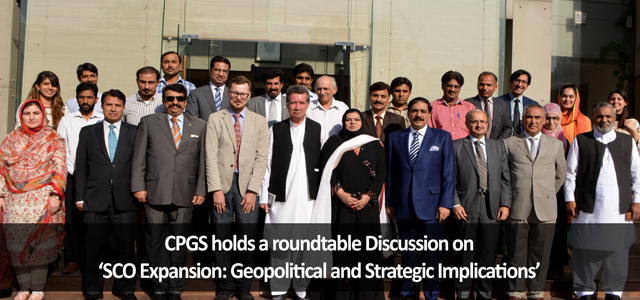“Pakistan will help SCO embrace the world and will act like a bridge […] we (Pakistan) would like to belong to the future” – Lt Gen (R) Naseer Khan Janjua, HI(M), National Security Advisor
Islamabad, May 17, 2016: “Pakistan’s ideal location enables it to become a source for regional economic integration within and between the SCO member states” stated Senator Sehar Kamran (TI) at a Roundtable discussion on ‘SCO Expansion: Geopolitical and Strategic Implications’ today at the Pakistan Institute for Parliamentary Services (PIPS). The event was organized by the Centre for Pakistan and Gulf Studies (CPGS) and attended by senior public officials, including Lt. Gen (R) Naseer Khan Janjua, National Security Advisor, H.E. Mr. Atadjan Movlamov, the Ambassador of Turkmenistan, Senator Afrasiab Khattak, representatives from NACTA, diplomats and academicians, as well as members of the media. The Roundtable was the third in the series under CPGS’ project “Regional Integration: Road to Peace and Prosperity”, and focused on the geopolitical and strategic implications of the SCOs expansion in the region, as well as beyond, as its theme.
In her welcome remarks, President CPGS Senator Sehar Kamran (TI) also remarked that SCO expansion and Pakistan’s inclusion in the organization will prove to be ‘mutually beneficial’, and Pakistan will act as a ‘zipper’ for the entire region. She emphasized that the expansion of the organization will better enable it to deter extra-regional pressures. With Pakistan’s permanent membership and vast experience in the context, new measures and joint ventures can also be taken for countering violent extremism in the region. Pakistan has achieved phenomenal success in internationally acclaimed ‘Operation Zarb-e-Azb’ and can share valuable expertise with the SCO member states.
Speakers for the event were Dr. Petr Topychkanov, Associate at the Carnegie Moscow Center’s Nonproliferation Program, and Dr Saif ur Rehman from the Institute for Strategic Studies, Research and Analysis (ISSRA) at the National Defense University (NDU). The proceedings were chaired by Dr Muhammad Khan, Head of the IR Department at NDU. During the discussion, the speakers highlighted the many implications of the SCO expansion for regional dynamics, as well as some of the challenges the process may face. Dr Topychkanov stated that SCO is different from NATO and building a military bloc is against its own interest, however, the organization believes in resolving regional issues without interfering in domestic problems of other states. Dr Saif ur Rehman said Islamabad is interested in regional connectivity through the SCO instead of military sharing.
Lt. General (R) Naseer Khan Janjua commended CPGS and Senator Sehar Kamran’s excellent endeavor for organizing a timely roundtable and said such an attitude of embracing the upcoming opportunities is laudable. He stated awareness is key to the acceptance if anything new and this is particularly true in the case of SCO. Pakistan will help SCO embrace the world and will act like a bridge. He also highlighted that “(Pakistanis) are brilliant and resilient people – we have endured this war for almost four decades; we’re misunderstood”, and that the SCO can play an important role in ameliorating the misperceptions surrounding the country.
Senator Afrasiab Khattak opined that it is ‘vital to create bridges and look for points of convergence. Today’s age is the age of connectivity. SCO expansion is timely and Pakistan will be looking to play an important role in the region’.



